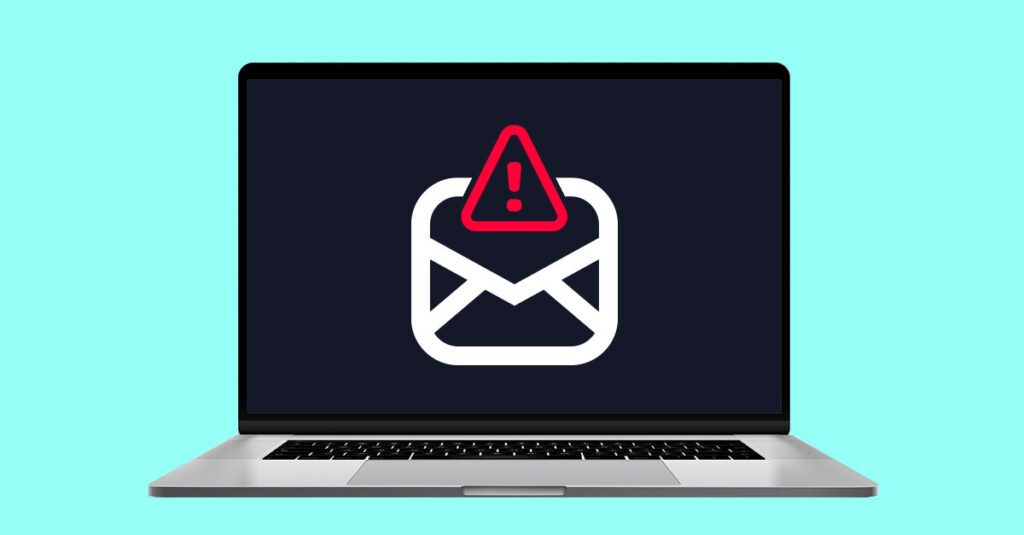
5 Emails You Should Never Open
Email scams, phishing attacks and spam can happen to anyone. While your email comes with fancy spam filters that are designed to detect and block scams, it’s not always foolproof. Scammers have developed sophisticated methods to scam individuals. They can create emails that look similar to trusted organizations and convince people to share their personal information or install malware onto their devices.
So, what can you do to prevent yourself from becoming a victim? The best move is to educate yourself on the signs of a suspicious email. Here are five signs that you may have just received an email scam:
1. Asks for personal information
The main goal of a phishing scam is to collect personal data to steal your identity or money. Scammers often do this by disguising the email to look like it’s from an official source such as your bank or the IRS. Because you trust those organizations, you could be fooled into handing over your personal information: social security number, login information or more sensitive data. If you need to verify the authenticity of an email, it’s best to contact the official organization directly and avoid replying to the email.
2. Urgent request
One of the biggest red flags of a scam is if the tone is urgent. Scammers don’t want you to stop and think about what you’re clicking or sharing, so they create a scenario where you will respond quickly. A phishing scam may claim there was a fraudulent transaction on your credit card—and then ask you to click a link to fix the issue. Of course, the link either downloads malware or collects your private information.
3. Sounds too good to be true
Did the government reach out to you to say you were entitled to a large tax refund? Did you win a million dollars? Or maybe someone is promising a way to get rich fast. All of these emails are often used by scammers to pull someone into a trap. If you receive one of these emails, you should take a few moments to judge if the email is from a legitimate organization. But it’s probably not.
4. Don’t recognize the sender
If you don’t know the person who sent the email, you probably shouldn’t open it. But this isn’t always easy to do. In a work environment, you may constantly get emails from people outside of your organization. In this case, always double-check the sender’s email address before you respond or click on any links. Scammers often use similar email addresses of familiar companies or organizations, but it’s slightly off. By examining the email address, you can save yourself from interacting with a scammer.
5. Unusual language
Grammar errors are often noted as being a sign of a potential scam. But there are some other things to look out for, too. Maybe the sender addresses you in a different way than normal. For example, they write “Hello, Ms. Smith” when you’re on a first-name basis. It could also be more obvious, like receiving an email in a language you don’t know.
What should I do if I open a suspicious email?
If you’ve opened an email and realize it may be a scam, it’s not too late to protect yourself. A scammer is probably not going to be able to put a virus on your computer or steal your private information just by you opening the email. Here are some steps you can take if you’ve received a suspicious email:
- Don’t open any attachments or links.
- Don’t respond to the email either, especially if it asks you to send sensitive information like your credit card number.
- If the email appears to be from your bank or another account you have, report it on the company website. They want to know about suspicious emails their customers are receiving and will probably have an email address where you can forward this fraudulent email.
- Report the phishing email to authorities like the Anti-Phishing Working Group at reportphishing@apwg.org or report to the Federal Trade Commission at https://reportfraud.ftc.gov/.
What if I click on a link or open an attachment?
If this is the case, the scammer may have installed malware on your device or gathered personal information. Here’s what to do:
- Update your security software, including your Wi-Fi network.
- Use antivirus software to catch threats. If it finds a virus, follow the instructions to remove it from your device.
- Go to IdentityTheft.gov to notify authorities your identity may have been compromised, and follow the advice on how to monitor your financial situation.`
How can I stay safe?
Phishing emails are specifically designed to manipulate people, so it’s not surprising when people fall victim to a scam. The best way to prevent identity or financial theft is to know the signs of a phishing email, and then take the appropriate action to not be victimized. You may also want to consider installing antivirus software to automatically scan your device to find and remove threats such as viruses.
Frontier Fiber is built for the way you live today—and tomorrow
If you’re still on the lookout for the right ultrafast internet connection for streaming, gaming, working from home and running your smart home—all with enough bandwidth for everyone—find out about Frontier Fiber. Frontier Fiber is available in select areas—check here to see when it’s available at your address. Once you have it, keep your identity and devices protected with Frontier’s security support.
Product features may have changed and are subject to change.




I am pestered by frequent emails purportedly from Frontier. The latest: “This to Notify you that the Classic version of your Mailbox will be replaced by our New version on 23rd of October 2023. We’re making these updates to clarify our terms and ensure that they remain transparent for you.” I have ignored and deleted such emails. Does Frontier (Yahoo, etc.) have an interest in stopping such emails? How can I help?
These emails sound like phishing attempts and ignoring and deleting them is an appropriate way to handle them. If you’re using the Yahoo email website or app you can mark as spam or junk which Yahoo will use to identify the ‘fingerprint’ of that email and improve their filtering. Unfortunately, scams such as these are an ongoing form of cyber-warfare with scammers coming up with new ways to word or structure their messages to avoid the filters and get through. ^Michael
I opened and replied to one of these and now can’t see any new emails. How can you help?
Hi Lynn, oh no! It sounds like you may have been compromised by a phishing scam. In order to retrieve your account you’ll need to use the Forgot Password function here: https://fybr.to/3FCZd2p to retrieve your account. ^Michael
I received an email from DoNotReplyFrontierBillPay@billmatrix.com saying the following:
“We are reaching out to inform you that your auto pay information was removed. If this was removed in error, please re-enter the information on you frontier.com online account or through the myFrontier mobile app.
Thank you,
Frontier®”
There seems to be several grammatical errors but the frontier.com address is correct. However, I never canceled my autopay and was wondering why I am receiving this email or who removed my payment information.
Hi Jacqueline, thanks for the post. One thing that has me thinking that this is a valid notification email is that it’s not trying to drive you to a specific resource that looks fishy, or would that be phishy? It has only mentioned the https://fybr.to/3us5rzC site by name and the mobile application by name. We do work with Bill Matrix / Fiserv for payment processing, which also makes me believe that it is valid. It was likely a system issue of some type and you should be able to log in and add your billing information back. if you have any concern that some type of unauthorized access may have caused this I would recommend reaching out to us for support through the social media links on this page or through our contact us links at https://fybr.to/3QZ7dQp. ^Michael
I received an email stating the below from a “kfletch@frontiernet.net”
We will be closing older versions of our mailbox as of November 30, 2023.
We strongly advise you to click the link button below and continue this quick update to keep your email address and update your features in the Mobile App/Desktop website.
Note: You may be redirected to your mailbox or asked to sign in again to complete this quick process.
CLICK HERE
Sincerely,
Mark Schubert E.
Frontier Services
I did not click here – how do determine if emails like this are valid?
Judy
Hi Judy, this would be a better question for our customer support teams available through social media at the links on this page or through our contact us page here: https://fybr.to/3R3vqoJ but that looks to me like a phishing email. If the mail headers match the email address you noted, the owner of that email address likely has the trojan virus on their computer that is sending out that email in an attempt to trick people to following that “click here” link and collect account credentials. I recommend deleting that after reporting that as spam or junkmail if your email software supports the option. ^Michael
Hello I just got this in my spam,
Here it it how it appears in my spam,
Frontier Communications
From: lahrdecden@frontier.com
We will be closing older versions of our mailbox as of December 30, 2023.
We strongly advise you to click the link button below and continue this quick update to keep your email address and update your features in the Mobile App/Desktop website.
Note: You may be redirected to your mailbox or asked to sign in again to complete this quick process.
Sincerely,
Mark Schubert E.
Frontier Services,
Is this real does this person work for frontier?
Hi Cody, that appears to be a phishing scam email. The domain for frontier employees is https://fybr.to/3RrUJB8 rather than https://fybr.to/41uU7PB. If that email address matches the actual email headers that means the sender likely has an email spam trojan or worm infection on their system, which is how these scams perpetuate. My best suggestion is to mark this as spam so the filters can ‘learn’ this email to block it in the future. ^Michael
What do I do if I did click on the link and it looked like it was asking me to login to my email again so I typed in my password? I also replied to the email asking if it was legit. I changed my email password almost immediately and I am still getting new emails. I ran malwarebytes and deleted 4 things it found. It did not say it was a Trojan or anything like that.
Hi Nancy. It sounds like you’re fine if your software is not catching any infection. If you were able to change your password, and you are still receiving emails your account should be safe. The sender of the email is likely the one infected with a trojan virus. ^Michael
I just got an email from Frontier communications saying that if I do not respond in 72 hours I will no longer have access to my email. It wants my social security number and my credit card number. to update security settings. I really am afraid to give that info out but it looks legit.
Hi Mary, you need to delete that email and do not provide any information. That is a phishing scam, it was not sent by us. ^Michael